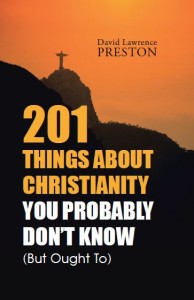The Hebrew Bible (Old Testament) is largely a symbolic and highly fictionalised account of a people’s struggles and their attempt to understand their world.
The New Testament is largely a symbolic and fictionalised account of a small clique’s efforts to convince their neighbours to believe that their crucified ‘prophet’ was more than human and that the world was about to be transformed by their G_d.
Even so, stories can contain an element of ‘truth’ without being literally ‘true’ – that’s the appeal of Aesop, Homer, the Brothers Grimm and almost every great novelist and playwright.
Perhaps the biblical writers were not so much concerned with facts as meaning, and it would be more beneficial to ask ourselves, ‘What meaning were they seeking to convey?’ than, ‘Is this literally true?’
That’s where the value of these ancient writings lies.
©David Lawrence Preston, 25.8.2017
Follow me on Facebook and Twitter @David_L_Preston


Leave a Reply